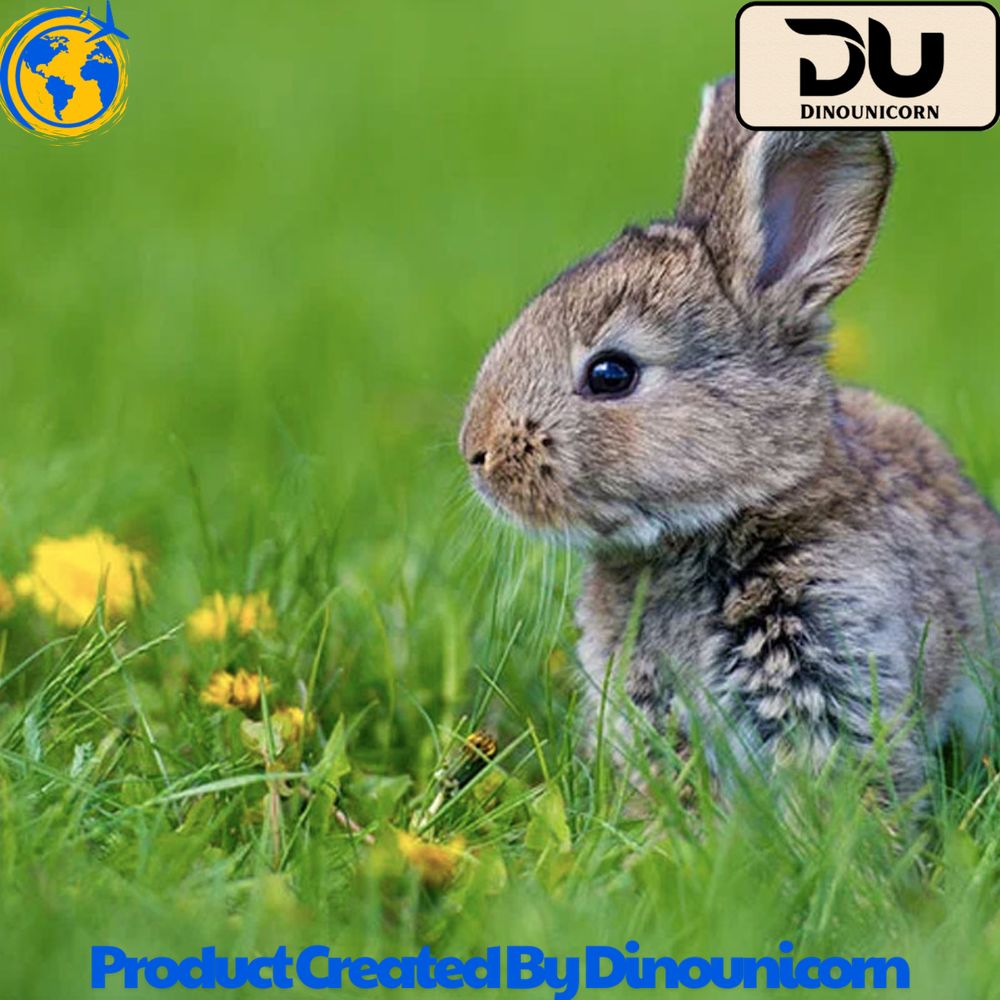Blog
What Do Baby Bunnies Eat?
Introduction: What Do Baby Bunnies Eat?
When you find an adorable, tiny baby bunny, your first instinct might be to take care of it, but understanding its diet is crucial to ensure it grows strong and healthy. What do baby bunnies eat? Baby bunnies, also known as kitten rabbits, have specific dietary needs that vary depending on their age, whether they are wild or domesticated, and if they are orphaned. Understanding their nutritional requirements is vital for their survival and development.
In this comprehensive guide, we will explore everything you need to know about feeding baby rabbits, including what they eat, how to care for them at different stages, and common mistakes to avoid.
Understanding the Feeding Needs of Baby Rabbits
Baby Bunny Diet: What’s Essential?
Just like any other animal, baby bunnies need proper nutrition to ensure they grow strong and stay healthy. The first thing to note is that baby bunnies rely on milk as their primary food source during the early stages of their life. In the wild, mother rabbits feed their young exclusively with breast milk for about 3 to 4 weeks. Domesticated baby bunnies should be treated the same, with baby bunny milk replacer being the best substitute if the mother isn’t available.
Rabbits have a sensitive digestive system, so it’s important to introduce solid food gradually. Their stomachs are not designed for sudden shifts, and improperly feeding them can lead to severe health issues.

What Do Newborn Baby Bunnies Eat?
Feeding Newborn Baby Bunnies: Essential Diets
At birth, newborn baby bunnies do not eat solid food. They are entirely dependent on mother rabbit’s milk for nourishment. If you come across a baby bunny in the wild or as an orphan, it’s important to note that newborn bunnies are not ready for anything other than milk replacer specifically designed for their needs.
For a newborn rabbit, the formula should mimic the mother’s milk to prevent digestive issues. Baby bunny milk replacer is specially formulated to provide the right balance of nutrients. You can find these formulas at pet stores or online retailers.
How to Feed Wild Baby Bunnies
Wild Baby Rabbit Diet: What Do Baby Rabbits Eat in the Wild?
Wild baby rabbits typically rely on their mothers for food for the first few weeks of life. If you encounter a wild baby bunny, it’s essential to avoid interfering unless absolutely necessary. If you must intervene, make sure to follow the right feeding practices.
Wild baby bunnies are typically fed by their mothers with a diet high in milk, which is rich in nutrients to promote healthy growth. After a few weeks, they begin to eat grass, leaves, and other vegetation found in the wild. If you’re raising an orphaned wild bunny, remember to introduce hay, leafy greens, and other vegetables gradually to avoid overwhelming their digestive system.
Feeding Baby Rabbits: The Transition from Milk to Solid Foods
At What Age Can Baby Bunnies Eat Solid Food?
The transition from milk to solid food is an important phase in a baby bunny’s life. Between 3 to 4 weeks old, baby rabbits begin to develop their teeth, and they start to nibble on the food their mothers eat. This is when they begin eating hay and soft vegetables.
At 3 weeks old, you can begin introducing small amounts of hay to your baby bunny’s diet. By 4 weeks old, they can start eating soft, leafy greens such as lettuce or dandelion leaves, but make sure that it’s done slowly to avoid upsetting their stomach.

Baby Bunny Food List: What to Feed Your Baby Rabbit After Weaning
After the weaning process is complete, typically around 8 weeks of age, your baby bunny can start enjoying a variety of fresh foods. Here’s a list of recommended foods to offer your baby bunny:
- Hay (Timothy hay is the best for baby bunnies)
- Leafy greens like parsley, dandelion greens, and romaine lettuce
- Carrots (in moderation)
- Apple slices (in moderation, with no seeds)
- Cucumbers
- Safe herbs like cilantro and basil
Always make sure to offer a fresh, clean supply of water.
What Do Baby Bunnies Eat at Different Ages?
Baby Bunnies at 3 Weeks Old: What to Feed Baby Bunnies
At 3 weeks old, baby bunnies should still be nursing, but they can start sampling small amounts of solid food. Begin with small portions of hay, especially soft varieties like timothy hay. This helps with their digestion and provides necessary fiber.
Also, introduce leafy greens to their diet at this age. Offer small amounts of greens, as their stomachs are still developing.

Baby Bunnies at 4 Weeks Old: Nutritional Milestones
At 4 weeks old, your baby bunny should be transitioning more into solid food. At this stage, they can begin eating more hay and leafy vegetables. You can also start offering them finely chopped herbs, carrots, and fruit in moderation.
At this point, it’s important to continue nursing your baby bunny, either with baby bunny milk replacer or the mother’s milk if possible. By now, the weaning process should be in full swing, and the baby bunny will begin eating larger portions of solid foods while gradually reducing milk intake.
How to Feed Orphaned Baby Rabbits
Caring for Orphaned Baby Rabbits: Baby Bunny Milk Replacer
If you find an orphaned baby bunny, you will need to feed it properly to ensure its survival. Baby bunny milk replacer is essential during the first few weeks of life. Make sure you’re using a high-quality formula specifically designed for rabbits. Follow the instructions on the packaging to avoid overfeeding or underfeeding.
After a few weeks, begin introducing hay and soft vegetables to the diet of the orphaned baby rabbit to help it adjust to solid foods.
What Can Baby Bunnies Eat Besides Milk?
Safe Foods for Baby Rabbits: Vegetables and Other Delights
As your baby bunny grows, its diet will gradually shift from milk to a variety of solid foods. Once they are around 8 weeks old, you can introduce a full range of vegetables, hay, and fruit into their diet. Vegetables like lettuce, carrots, and cucumber should be offered in moderation, as too much of certain foods can upset their digestive system.
In addition to vegetables, ensure that they have a constant supply of timothy hay, which provides fiber for healthy digestion and dental care.
Emergency Feeding: What to Feed a Baby Bunny in an Emergency
What to Feed Baby Bunnies in an Urgent Situation
If you find a baby bunny in an emergency situation (such as being separated from its mother), it’s important to feed it the correct food right away. In this case, you should use baby bunny milk replacer and follow the instructions on the product carefully. Avoid feeding cow’s milk, as it can be harmful to baby rabbits.
You can also give the bunny a small amount of fresh hay and water, but always prioritize the milk replacer to ensure proper nutrition.
What to Avoid When Feeding Baby Bunnies
What Not to Feed Baby Bunnies: Harmful Foods to Avoid
Certain foods are harmful to baby bunnies and should be avoided at all costs. Baby rabbits should not eat the following:
- Iceberg lettuce (can cause digestive issues)
- Sugary fruits (can cause diarrhea)
- Chocolate
- Onions and garlic
- Cabbage (may cause bloating)
Always stick to safe, bunny-friendly foods to ensure the baby rabbit remains healthy.
Conclusion: Essential Baby Bunny Nutrition for Healthy Growth
Baby Bunny Care Tips for a Long and Healthy Life
Feeding a baby bunny the right diet is essential for its growth and well-being. Start by providing baby bunny milk replacer and gradually introduce solid foods like hay and vegetables. By following the correct diet plan at each stage of development, you’ll help your baby bunny thrive and grow into a healthy adult rabbit.
Always ensure a clean supply of fresh water, avoid harmful foods, and gradually transition to solid foods as your bunny matures. With these tips in mind, you’ll be well on your way to raising a healthy and happy baby bunny.

Frequently Asked Questions (FAQ)
Q1: Can I feed my baby bunny cow’s milk?
- No, cow’s milk is harmful to baby bunnies. Use baby bunny milk replacer instead.
Q2: When can I start feeding my baby bunny solid foods?
- Baby bunnies can begin eating solid food at around 3 to 4 weeks old.
Q3: What vegetables can I feed my baby bunny?
- You can feed baby bunnies parsley, romaine lettuce, carrots, and cucumbers.
Q4: How do I care for an orphaned baby bunny?
- Use baby bunny milk replacer and gradually introduce solid food once the bunny is old enough.
Q5: What should I do if I find a wild baby bunny?
- If possible, leave it alone and allow its mother to care for it. If the bunny is orphaned, provide appropriate care and feeding, including baby bunny milk replacer.
Top Resources for Baby Bunny Care:
- American Rabbit Breeders Association
- Petfinder – Rabbit Care
- The Humane Society
- Rabbit Care Basics
- House Rabbit Society
- RSPCA – Rabbit Care
- The House Rabbit Handbook
- Bunny Bunch
- Petco – Rabbit Care
- Bunny Rescue
 Skip to content
Skip to content

